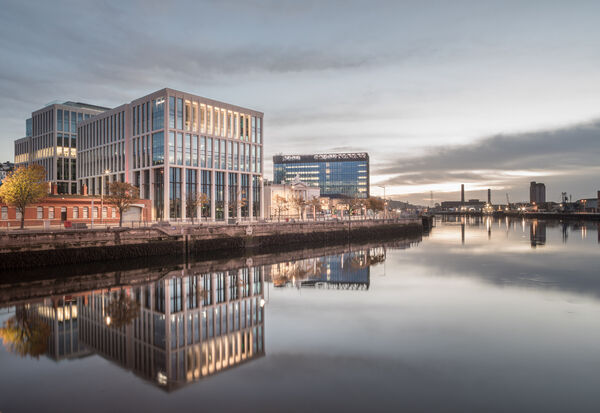The office is dead. Long live the office

With news emerging this week that suggests the reopening of non-essential construction activities might be pushed out by a further month, to early April, it was good to read that Dublin is now the most popular destination for financial services firms moving business out of London. While this is not altogether unexpected or surprising, it is an important confirmation, particularly in light of the ongoing speculation about the future of work and the evolving role of the office.
The figures around the growing popularity of Dublin as a primary EU hub for financial services in a post-Brexit world were published by The Observer (UK publication) last weekend. That article quotes figures from accountants EY confirming that a total of 34 companies, including Barclays and Bank of America, have already shifted jobs to Dublin since the Brexit referendum vote. And it makes sense. We knew anecdotally that London city firms had been quietly leasing space in Dublin and in other EU capital cities, including Luxembourg, Amsterdam, and Paris in order to ensure business continuity with their EU clients.
Understanding the thinking of large organisations – across every sector – about their workplaces and the evolving remote working practices is helpful. There is a definite sense of proclaiming, ‘The office is dead. Long live the office’. In fact, earlier this week The Irish Times ran an article headed ‘Long-term investors have already decided on the future of the office’. This headline was based on commentary from the chief executive of Iput, Niall Gaffney, who opined that prime offices will continue to appreciate in value in the post-pandemic era. He is basing this on the number of long-term investors that have acquired or are in negotiations to acquire offices in Dublin and indeed other international cities, despite the ongoing impacts of Covid-19. This commentary comes after the posting of the company’s 2020 financial results. Interestingly, the Iput chief robustly dismissed speculation about the survival of the office post-pandemic saying: “People talk about the long term. Most of it is BS. It’s not really long term. Long-term investors look through 10-year and 20-year cycles. What I admire about the German investors that we deal with, and we’ve seen them active in the city, they’ve taken the opportunity to buy office investments in Dublin against this backdrop. They see this pandemic and they see it settling down, and that we come through it…” No need for interpretation there, the thinking and investment approach is pretty clear, particularly in the current low interest rate environment. It is not a stretch to assume real assets will continue to appreciate in value and as investment shows, time and time again, assets that produce quality income over the long-term are likely to appreciate the most.
Ian Lawlor
086 3625482
Managing Director
Lotus Investment Group
